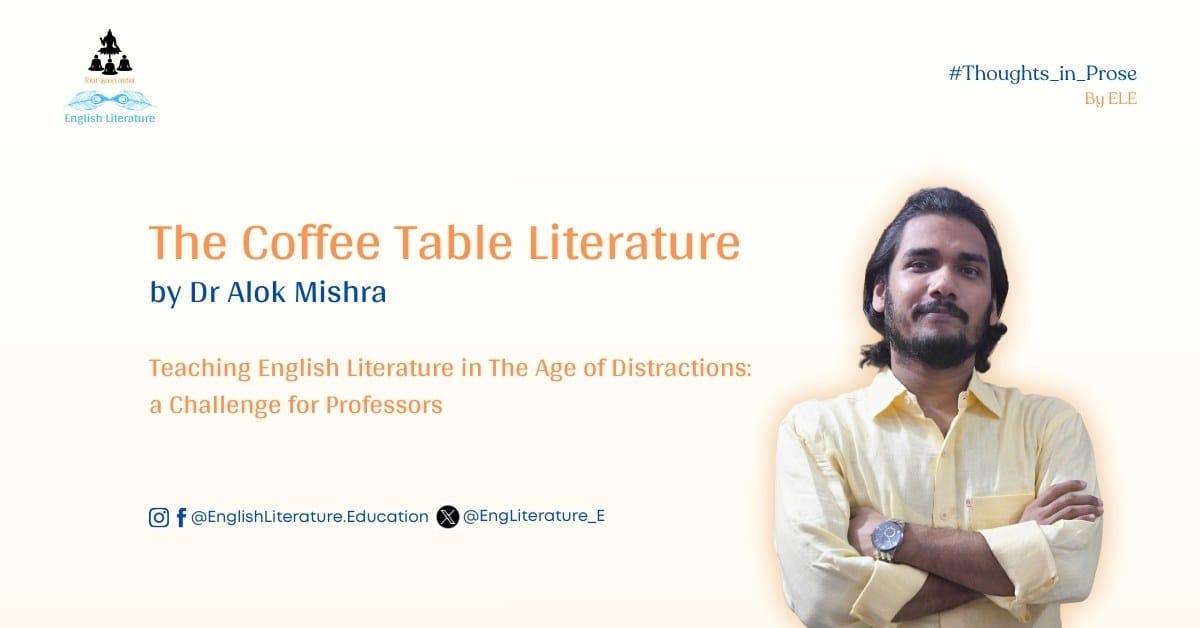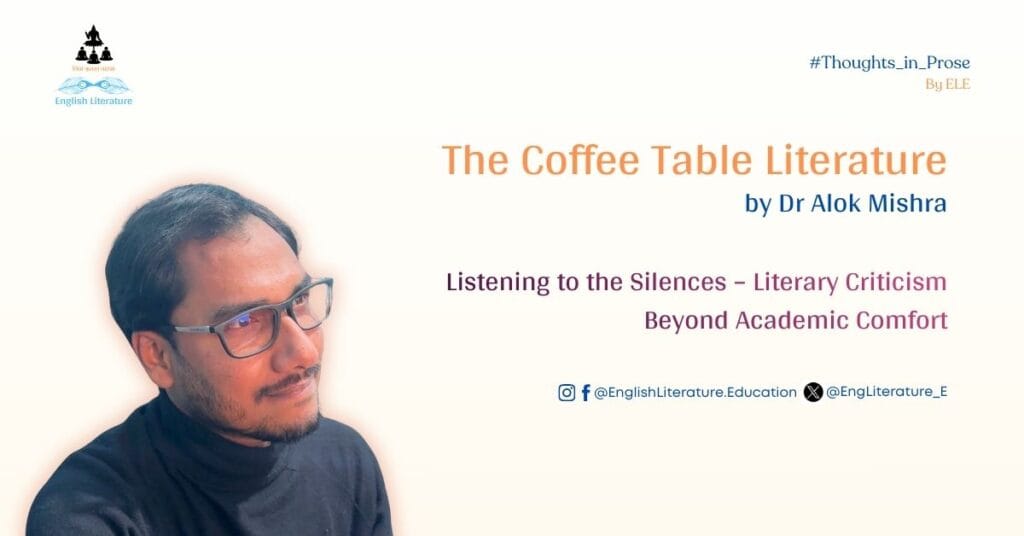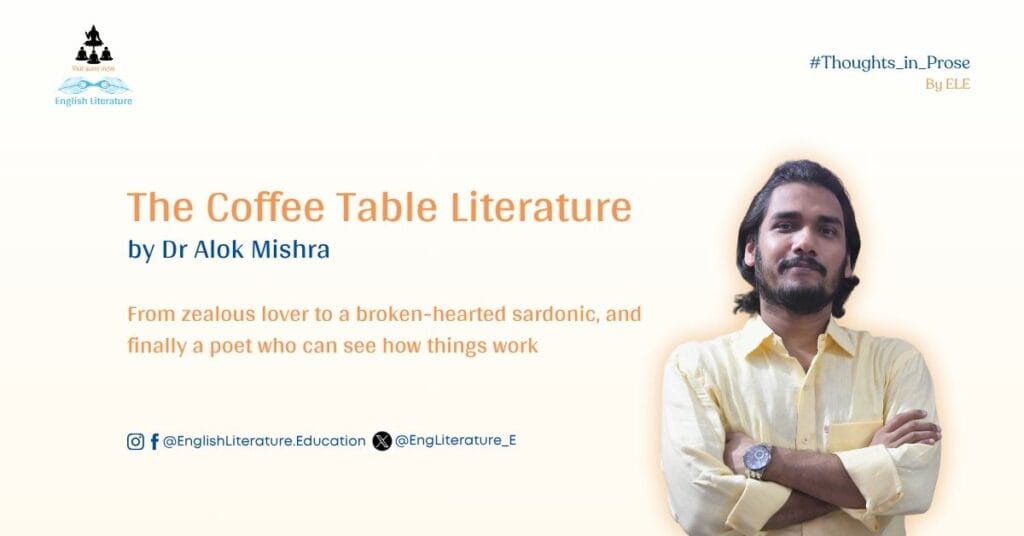Unfortunately, no law of thermodynamics governs the process of teaching and ensures a smooth transfer of knowledge between professors and students. How comfortable could that be? Truth be told, learning and teaching can never be simple. Well, after all, as we Indians believe, teaching is a noble job and a student’s life is no less than penance! Moreover, nobility, my friends, comes at a high cost (these days, especially).
I have been teaching and reflecting on literature for a long time now, and this awareness has deepened in me with every passing year: teaching is never a matter of linear transmission. It is not a one-way current flowing from my mind to the minds of my students. Rather, it is a complex dialogue shaped by differences in age, temperament, background, and experience. What I have discovered is that to communicate the essence of literature truly, one must unlearn many of the conventional assumptions about teaching.
Professors of English literature, especially those who have been active for more than 20-30 years now, I dare say, will have to accommodate the freshers who enrol for BA English Major programs. I do not imply they are not capable. My humble submission is that the students of this generation have different learning and reading habits. They need personalised guidance to understand how profound the world of literature is! Diagonal communication in the classroom, further hindered by a one-way flow of thoughts and ideas, may deprive students of the vast knowledge and experience that senior professors have accumulated over the years. Therefore, professors of literature must initiate the new students, mould their curiosity and interest, inspire them to engage with literary texts, and impart the basics and nuances needed to understand how literature functions.
This is what I try to remind myself constantly. I cannot simply assume that my students come prepared with the same reverence for Shakespeare or Dickens with which my teachers once introduced me to the literary canon. I must begin at a different point, one closer to their realities. It is akin to introducing a prodigy to the fundamentals of drag, demanding corners, slipstream, and factors that affect tyres, while also discussing the real-life consequences of accidents involving F1 cars, disregarding the fact that the prodigy may have been a four-time drivers’ world champion in the virtual F1 seasons. A young literature student should ideally be introduced to the concepts of plot, imagery, narrative, genres, rhyme, protagonist, climax, anticlimax, irony, and other technical ideas that are helpful in understanding, interpreting, and appreciating a literary work. Moreover, this task is incumbent on professors before they begin singing the usual lofty odes admiring Shakespeare, Wordsworth, and Dickens.
In my classroom, I often remind students that literature begins with curiosity about language and form. It does not begin with ready-made conclusions about greatness. When I first read Marlowe, I was struck not by the label of his genius but by the difficulty of his words. I had to wrestle with them, pause, reread, and imagine. This is why I insist: it is a must-do job for professors because students must overcome the delusion that understanding the English language will facilitate understanding of English literature. Even a fluent speaker of English may not be able to interpret a few lines by Marlowe! The distinction needs to be drawn before students become irritated by trying to grasp it on their own and become disillusioned.
I know from my own experience, as both a student and a teacher, that frustration is often born from the gap between expectations and reality. When students enter the world of literature believing that their fluency in English will be enough, they quickly find themselves confused. Unless I step in to show them the tools—plot, imagery, irony, narrative—they will simply lose heart. The professor, therefore, must become a bridge, easing them into this vast world one careful step at a time.
At the same time, I also bring to the attention of professors the fact that they must recuse themselves from instilling absolutes in the minds of young students. Someone may or may not be the greatest of any age, field or stream. It is entirely upon the discretion of personal preferences, understanding and grasp of individuals rather than an idea to be imposed by intellectual force. Let students explore who was the best by virtue of their own interpretation and learning. Professors should focus on teaching the art of interpretation, not the interpretation itself. This practice, unfortunately ongoing, belies the very creative force that literature embodies. Rather than being open to interpretation, a work of literature is presented as a rigid structure, suitable for only one interpretation, the one that the professor decides. Is it any good?
This is one of my strongest convictions. Literature dies when it is reduced to a set of commandments, a collection of frozen meanings. I do not want my students to parrot my interpretations. I want them to develop their own. Shakespeare will live longer if every generation finds in him something new rather than memorising what previous critics have already declared. Eliot will have meaning if a young reader in the twenty-first century can connect his fragmented vision to her own fragmented digital life. Literature must breathe, and it breathes only when students are free to interpret.
Let me illustrate. When I teach Wordsworth, I do not begin by declaring him the high priest of Romanticism or the greatest poet of nature. I ask my students first to describe what they feel when they encounter nature in solitude. Then, when I bring in Wordsworth’s lines, they are ready to compare their feelings with his. This is interpretation in action: not my voice telling them what to think, but their voices discovering what they see.
The larger question is not only pedagogical but ethical. What right do I have to impose my preferences as absolute truths? Shouldn’t I, instead, equip my students with the tools to form judgments on their own? That is what I mean when I say professors should focus on teaching the art of interpretation, not the interpretation itself.
Teaching literature in India today often feels like navigating a paradox. On the one hand, we have students who are hungry for knowledge and eager to prove themselves in competitive environments. On the other hand, we have institutional structures that still reward memorisation and conformity rather than curiosity and originality. To teach in such a climate requires courage. It requires resisting the pressure to supply easy answers. It requires believing that students are capable of independent thought, even if the system prefers to treat them as passive recipients.
I often remind myself that teaching is a noble job and a student’s life is no less than a penance. Yet I am also aware of the irony: nobility comes at a high cost, especially today, when time, resources, and institutional freedom are shrinking. To persist in teaching literature with passion, to resist shortcuts, is to accept that cost. But I do so willingly because the reward is immeasurable: to see a young student’s eyes light up when they realise that literature is not dead history but living dialogue.
For me, the joy of teaching has always been in this moment of discovery. When a student reads Hamlet’s soliloquy not as a puzzle to be solved but as a cry that echoes his or her own uncertainty, I know literature has done its work. When a classroom debate about Achebe and Conrad transcends colonial binaries to explore the students’ own experiences of power and identity, I know we have gone deeper than the syllabus. This is why I resist absolutes. This is why I insist on beginning with fundamentals. And this is why I refuse to reduce teaching to the mechanical transfer of knowledge.
In conclusion, I can only return to the thought with which I began. Unfortunately, no law of thermodynamics governs the process of teaching and ensures a smooth transfer of knowledge between professors and students. But perhaps this is for the best. Teaching is not meant to be mechanical. It is meant to be messy, difficult, unpredictable, and deeply human. And that is why it is noble. Literature thrives on multiplicity, ambiguity, and freedom. If we can make our classrooms reflect the same, then we will have done justice to both our students and the great works we teach.
Dr Alok Mishra
for English Literature Education



